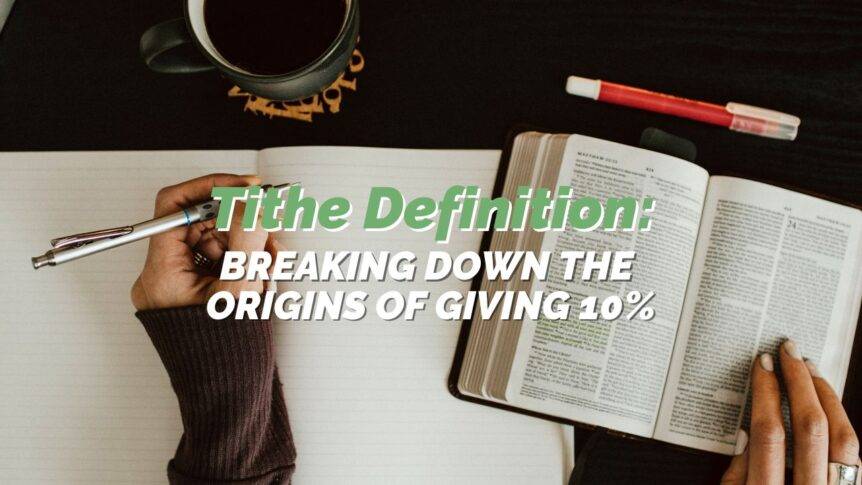What does it mean to pay tithes? Is it different than an offering? Do I have to make more money before I can tithe? There are so many questions when it comes to tithing. A simple tithe definition is to give a tenth part of one’s income or 10%.
Whether you’ve studied the history of the tithe or not, we hope we can explain where this term comes from Biblically and help you decide on tithing. If you’re interested in watching sermons about this topic, Pastor Robert Morris of Gateway Church has a fantastic message about the Principle of First.
Table of contents
Estimated reading time: 11 minutes
Origin of Tithing

The etymology of the word “tithe” is derived from the Old English word “teogoþa”, which means “tenth.” In biblical terms, tithing refers to giving one tenth, or 10%, of one’s income or resources to support the church or a religious community. Tithing has a rich and deep history in the Bible and is found all throughout the Old and New Testaments.
Tithing made it’s first appearance in the Bible when Abraham gave one-tenth of the spoils of war to Melchizedek, the priest-king of Salem (Genesis 14:18-20). The writer of Hebrews inferred that tithes were paid to a higher authority and that there was a greater priesthood than Aaron’s (Hebrews 7:4-9). Tithing as a tribute to God appeared later in Genesis when Jacob promised to give one tenth to God if he returned home safely. But these tithes were spontaneous, and not many details were given.
Abraham’s Tithe
The concept of tithing can be traced all the way back to very early times in the book of Genesis when Abraham paid tithes and offered a tenth of his spoils of war to the priest Melchizedek.
“Then Melchizedek king of Salem brought out bread and wine. He was priest of God Most High,and he blessed Abram, saying,
“Blessed be Abram by God Most High,
Creator of heaven and earth.
And praise be to God Most High,
who delivered your enemies into your hand.”
Then Abram gave him a tenth of everything.” – Genesis 14:18-20
Mosaic Law
Tithing became more of a structured practice under the Mosaic Law. In Leviticus 27:30-32, the Israelites were instructed to give a tenth of their crops, livestock, and their personal income as an offering to the Lord. This tithe supported the Levites, who were responsible for the religious duties of the community.
“‘A tithe of everything from the land, whether grain from the soil or fruit from the trees, belongs to the Lord; it is holy to the Lord. Whoever would redeem any of their tithe must add a fifth of the value to it. Every tithe of the herd and flock—every tenth animal that passes under the shepherd’s rod—will be holy to the Lord.” – Leviticus 27:30-32
Prophet Malachi’s Message
Malachi urged the people of Israel to faithfully tithe, emphasizing that by doing so, they would experience God’s blessings. This bible verse is often used in messages around tithing during a church service.
“Bring the whole tithe into the storehouse, that there may be food in my house. Test me in this,” says the Lord Almighty, “and see if I will not throw open the floodgates of heaven and pour out so much blessing that there will not be room enough to store it.” – Malachi 3:10
Old Testament vs. New Testament Tithe

The tithing required by the Israelites was a part of the Mosaic Law in Old Testament Law. When Jesus fulfilled the requirements of the Mosaic Law, the obligation to tithe was also abolished.
Old Testament
The money (or its equivalent in crops, livestock etc.) was used to support the clergy maintain churches, and assist the poor. In fact there are three different “types” of tithes. There is the Levitical, or sacred tithe, the tithe of the feasts, and the poor tithe. Each one has a slightly different purpose and significance.
“But nothing that a person owns and devotes to the LORD—whether a human being or an animal or family land—may be sold or redeemed; everything so devoted is most holy to the LORD. “No person devoted to destruction may be ransomed; they are to be put to death. A tithe of everything from the land, whether grain from the soil or fruit from the trees, belongs to the LORD; it is holy to the LORD. Whoever would redeem any of their tithe must add a fifth of the value to it. Every tithe of the herd and flock—every tenth animal that passes under the shepherd’s rod—will be holy to the LORD.” -Leviticus 27:28-32
New Testament
The tithe definition does of course emphasize the principles of generosity, stewardship, and giving. The New Testament encourages believers to give cheerfully and sacrificially, not merely as a legalistic obligation as opposed in the time of the Old Testament Law.
The Widow’s Offering: In Mark 12:41-44, Jesus commended a poor widow for giving her two small coins, highlighting the importance of giving from the heart, regardless of the amount.
“Jesus sat down opposite the place where the offerings were put and watched the crowd putting their money into the temple treasury. Many rich people threw in large amounts. But a poor widow came and put in two very small copper coins, worth only a few cents.Calling his disciples to him, Jesus said, “Truly I tell you, this poor widow has put more into the treasury than all the others. They all gave out of their wealth; but she, out of her poverty, put in everything—all she had to live on.” – Mark 12:41-44
The emphasis on tithing in the New Testament is placed on a sacrificial giving and not on the specific amount. Whoever has a cheerful heart when they give shall be blessed. God does not want us to begrudgingly give away our money. It should be a desire of our hearts to help others and help the church.
Why Tithe Today?

There are many reasons we should tithe today. It’s important that we don’t shy away from this topic during our church services. Check out our blog post to find out which part of the service works best to talk about tithing.
Obedience and Trust
Tithing reflects our obedience to God’s commands and trust in His provision. Believers demonstrate their own faith by giving a portion of their resources back to God. When we give every part of our lives, including our finances, to God, it shows our obedience.
Supporting Ministry and Outreach
Tithes and offerings contribute to the financial sustainability of churches and ministries. They enable religious institutions to carry out their missions, support the staff, and engage in community outreach. Without tithing, many churches aren’t able to function properly.
Blessings and Gratitude
Tithing is often seen as a way to express gratitude to God for His blessings. By giving back, believers acknowledge that all they have comes from God. It is God who blesses us and provides for us, so therefore we should be grateful and be willing to give back to God a tenth of our income.
How to Tithe

While tithing 10% of your income is biblical, that doesn’t mean you have to be a Christian to tithe. It also doesn’t mean you’re considered a bad Christian if you don’t tithe. Research even shows that the majority of those who go to church (75% to 90%) don’t even tithe. Thankfully, God loves us when we give and when we don’t give.
Just because you might always be in a position to give 10 percent of your income, doesn’t make you lesser. But it does mean that through faith in Christ, you will be empowered to be generous with what you do have.
Pray
Tithing is actually more of a heart issue than a money issue. If you’re struggling with the idea of tithing or giving, spend some time with God, asking Him to give you wisdom and show you ways that you can help others—or even just to be more generous. Even if giving doesn’t come naturally, prayer can help soften our hearts and refocus our intentions. If we are giving with the intention of only receiving then our hearts are not in the right place.
Allocate a monthly budget
It’s hard to know how much you can give if you have no clue where your money’s going. You need a plan. So you need a monthly budget! Before the month begins, you should create your own zero-based budget (where your income minus your expenses equals zero).
Start with putting aside 10% of your income for tithing, then budget for savings. After that, budget for your Four Walls (food, utilities, shelter and transportation) and other necessities like insurance and day care. That way, you know exactly how much you can spend on things like streaming services, entertainment and those Target runs. You may decide to give based on your taxable income or pre-tax income. You can even create a “random giving” budget line for when you want to help someone in the spur of the moment.
Budgeting often takes a minimum of three months to get the hang of. And tithing, if it isn’t a habit yet, can take some getting used to as well. As long as you’re taking steps to be more generous with what you have, you’re on the right track.
Set up online giving or in-person giving
Many churches have tried to make tithing as easy as possible. If you go to church, they may have a way to give online (or through an app). And many churches even let you set up automatic payments each month, which is great—especially if you have a regular income.
Of course, maybe you prefer writing a check or giving cash because it’s a physical reminder of the money you’re taking out of your wallet and giving away. It really doesn’t matter if you’re giving online or in person, as long as you’re giving!
Bible Verses to Inspire You About Tithing

Matthew 6:19–21
(Jesus said) “Do not store up for yourselves treasures on earth, where moth and rust destroy, and where thieves break in and steal. But store up for yourselves treasures in heaven, where moth and rust do not destroy, and where thieves do not break in and steal. For where your treasure is, there your heart will be also.”
Matthew 23:23
“Woe to you, teachers of the law and Pharisees, you hypocrites! You give a tenth of your spices—mint, dill and cumin. But you have neglected the more important matters of the law—justice, mercy and faithfulness. You should have practiced the latter, without neglecting the former.”
1 Corinthians 16:2
“On every Lord’s Day each of you should put aside something from what you have earned during the week, and use it for this offering. The amount depends on how much the Lord has helped you earn.”
Romans 12:1
“Therefore, I urge you, brothers and sisters, in view of God’s mercy, to offer your bodies as a living sacrifice, holy and pleasing to God—this is your true and proper worship.”
2 Corinthians 9:6
“Remember this: Whoever sows sparingly will also reap sparingly, and whoever sows generously will also reap generously.”
Exodus 35:21
“Everyone who was willing and whose heart moved him came and brought an offering to the LORD for the work.”
1 Chronicles 29:11–12
“Everything in heaven and earth is Yours, O LORD. Wealth and honor come from you; you are the ruler of all things. In your hands are strength and power to exalt and give strength to all.”
Deuteronomy 8:18
“Remember the LORD your God, for it is he who gives you the ability to produce wealth.”
Deuteronomy 16:17
“Each of you must bring a gift in proportion to the way the LORD your God has blessed you.”
Luke 6:38
“If you give, you will get! Your gift will return to you in full and overflowing measure, pressed down, shaken together to make room for more, and running over. Whatever measure you use to give– large or small– will be used to measure what is given back to you.”
Tithing Fast Facts
- 5% of churchgoers tithe (Church Development).
- Out of the 247 million U.S. citizens identifying as Christians, 1.5 million people tithe (Sharefaith).
- 77% of tithers give more than 10% (Health Research Funding).
- Churchgoers age 35-44 are two times as likely to give with an app compared to those age 24-34 (Vanco Churchgoer Giving Study).
- Statistics show that adding an online giving option increases church donations by 32%.
- 30% of churchgoers 45-54 years of age say they prefer making donations with their credit or debit cards.
- Churchgoers age 24-34 prefer to donate with their credit cards more than any other demographic.
- Women make up three quarters of North American donors (Nonprofit Tech for Good).
- Baby boomers give $613 more each year than donors under 40 (Philanthropy Daily).
- People who regularly attend services give an average of $1,737 more to faith each year than those who do not even attend once a month (Philanthropy Daily).
Summary
Hopefully, we’ve helped to answer any questions you might have had about the tithe definition. Tithing remains important to this day no matter the religious organization. It’s all about giving from the heart, so take time to pray and ask God what you should do.




